Court breaks for lunchpublished at 13:07 GMT 20 February 2024
The court is now breaking for lunch and we'll continue reporting live here with the latest updates when the hearing resumes.
Wikileaks founder Julian Assange is making a final bid to appeal against his extradition from the UK to the US in the High Court in London
Assange, who is not appearing in court because of illness, has been in a UK prison since 2019 and is wanted by the US for disclosing secret military files in 2010 and 2011
In 2021, the UK High Court ruled that he should be extradited, dismissing claims that his poor mental health meant he might take his own life in a US jail
In 2022, the Supreme Court upheld that decision and then-Home Secretary Priti Patel confirmed the extradition order
In today's hearing, Assange is seeking permission to review Priti Patel's decision and challenge the original 2021 court ruling
If he fails, Assange will have exhausted all appeal routes in the UK and will enter the process of extradition
He says the case against him is politically motivated and his lawyers have suggested they will take the case to the European Court of Human Rights if the appeal is turned down
Edited by Johanna Chisholm and Andrew Humphrey
The court is now breaking for lunch and we'll continue reporting live here with the latest updates when the hearing resumes.
The court is now hearing a little more from Julian Assange's legal team about an alleged US plot to either kill or kidnap the Wikileaks co-founder.
"What the evidence now shows is that the US developed a plan to try to either kill or rendition Mr Assange to the USA," Mark Summers KC, for Assange, told judges.
"What evidence the district judge heard on that came from protected witness two and it was truly breathtaking."
Summers tells the court there was a plan to kidnap or poison Assange in the Ecuadorian embassy in London, where he remained for about seven years.
"With respect to the district judge, there were red flags everywhere," Summers says, adding the plan "only fell apart when the UK authorities weren't very keen on the thought of rendition, or a shootout, in the streets of London".
 Nicky Schiller
Nicky Schiller
Reporting from outside the High Court
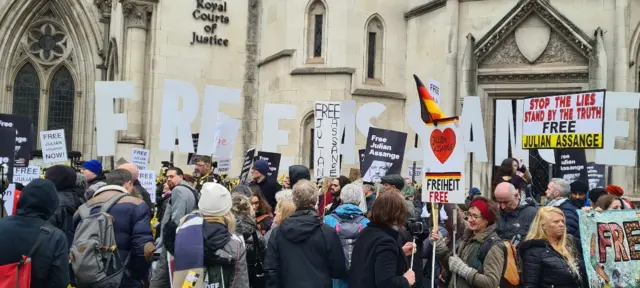
I'm still outside the High Court with hundreds of Julian Assange's supporters.
In the last hour or so, a group carrying giant white letters has arrived and stood together to spell out "Free Assange".
Some supporters are banging little drums and moving around as others sip from coffee cups and chat among themselves.
Every now and then a passing car or van will beep its horn.
Inside Assange's lawyers are continuing to put their case before the judges.
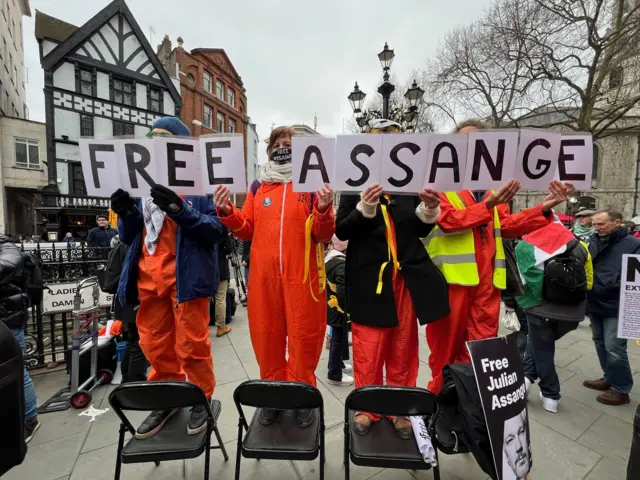
In several cities across the globe, rallies are being held in support of Assange. Take a look at some of them below:
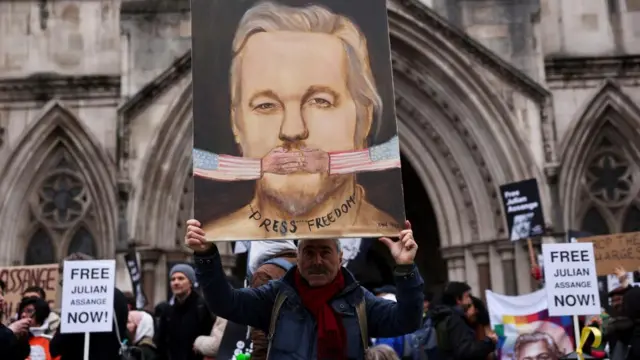 Image source, Reuters
Image source, ReutersLondon, UK
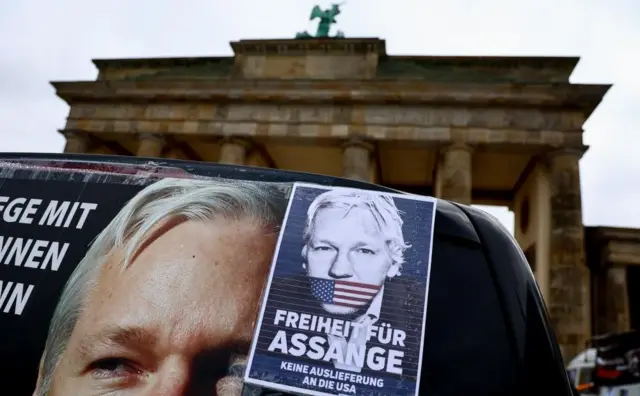 Image source, EPA
Image source, EPABerlin, Germany
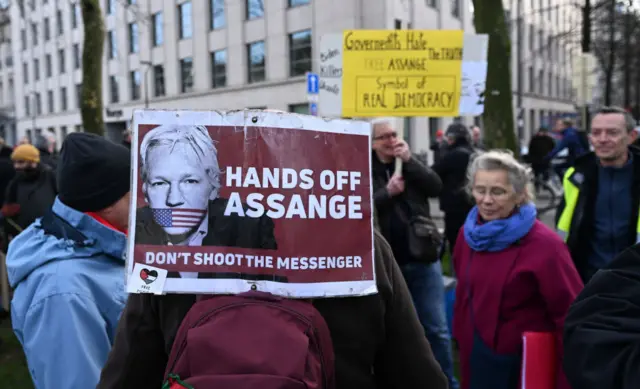 Image source, Getty Images
Image source, Getty ImagesBrussels, Belgium
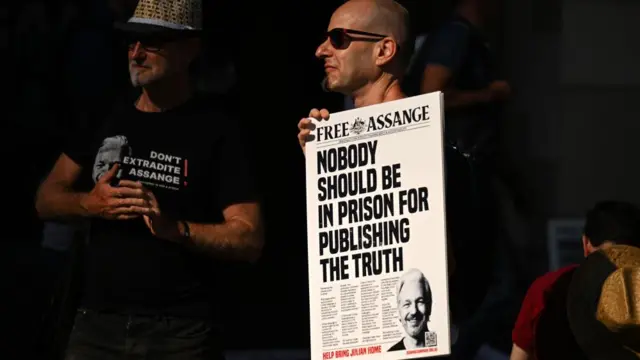 Image source, EPA
Image source, EPAMelbourne, Australia
 Image source, Getty Images
Image source, Getty ImagesFormer US soldier Chelsea Manning, who served a jail term for handing over military documents to Wikileaks
The thousands of classified US military documents published by Wikileaks - which are at the heart of today's application for leave to appeal - are said to have originated from former US soldier Chelsea Manning.
Back in 2013, Manning was court martialled and sentenced to 35 years in prison for charges relating to this leak. But this sentence was later commuted by then US President Barack Obama after she'd already served four years in prison.
This did not, however, mark the end of Manning's legal woes.
In 2019, Julian Assange was charged with 17 new counts under the Espionage Act and in that case, a US grand jury demanded that Manning give evidence against the Wikileaks co-founder.
But Manning refused, saying she would "rather starve to death" than cooperate.
This meant the former soldier was in contempt of court and the impact of that choice was costly. For every day she refused to give evidence she was charged $500 (£397).
She was then remanded in custody for nearly two years. When Manning was finally released, she had accrued more than $250,000 (£198,000) in fines.
Watch the recent Louis Theroux interview with Manning on BBC iPlayer.
 Dominic Casciani
Dominic Casciani
Home and legal correspondent reporting from the High Court
Assange’s team need to show his case is very similar to earlier courtroom battles involving allegations of politically-motivated prosecution.
One of their examples from the US Court of Appeal is a neat summary of the argument.
“Where the whistle blows against corrupt government officials, it may constitute political activity sufficient to form the basis of persecution on account of political opinion,” said the US judges in 2000.
“Official retaliation against those who expose and prosecute governmental corruption may, in appropriate circumstances, amount to persecution on account of political opinion.”
That‘s one of the core arguments they want the court in London to accept.
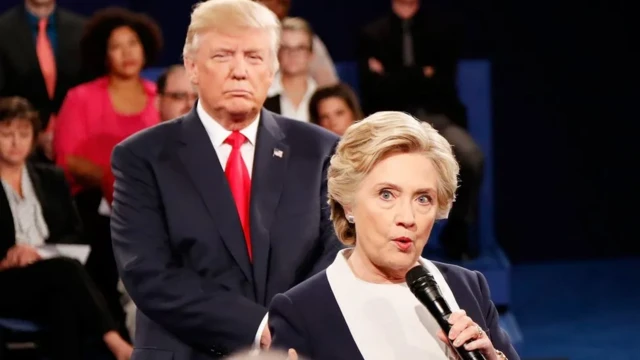 Image source, Getty Images
Image source, Getty ImagesWikileaks played a key role in the 2016 US Presidential election
The leaking of classified information on the US military's campaigns in Afghanistan and Iraq occurred during Barack Obama's time as US President, but it was his successor Donald Trump who pursued prosecution.
It was also Assange's website, Wikileaks, that was behind the hacking and publishing of Hillary Clinton's private emails, occurring just weeks before she was slated to challenge Trump at the ballot box in the 2016 presidential election.
On the campaign trail, Trump heaped praise on Wikileaks, saying at one rally that “Wikileaks is like a treasure trove,” and “Boy, I love reading Wikileaks,” at another.
But in 2019, when asked about the prosecution of Assange, Trump said: "I know nothing really about him. That’s not my deal in life.”
For her part, Clinton welcomed the arrest of Assange, saying in 2019: "The bottom line is he has to answer for what he has done."
As Obama's vice-president back in 2010, Joe Biden remarked that the Afghanistan leak had put people's lives in danger and said he more closely resembled a high-tech terrorist than a whistleblower.
Currently, as US President, Biden hasn't said much about Assange, instead letting his actions do the talking by continuing to pursue his extradition to the US to face charges there.
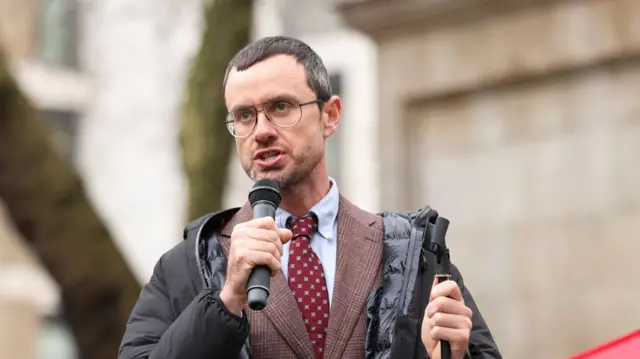 Image source, Reuters
Image source, ReutersGabriel Shipton, Julian Assange's brother, addressed crowds gathered outside the High Court earlier
As we've been reporting, Julian Assange's lawyer says the Wikileaks founder is not in court today as he is unwell.
Assange's wife Stella told the BBC yesterday that he would not survive being extradited from the UK to the US as he is physically and mentally extremely weak.
Speaking to TalkTV this morning, Assange's brother Gabriel Shipton said his health was in "a very delicate position" and he was "going through immense amounts of suffering" at Belmarsh Prison, where he has been since 2019.
 Dominic Casciani
Dominic Casciani
Home and legal correspondent, reporting from the High Court
The permission to appeal hearing is their attempt to convince the court Julian Assange has a case that needs examining. They don’t need to prove that Assange is the victim of a politically-motivated prosecution.
They don’t need to prove the law bans his extradition to the US because of a breach of human rights. And they don’t need to prove a previous judge in this case definitely got it wrong.
But they do need to convince the two High Court judges that they have an “arguable” case - that Assange’s claims of being a victim of injustice are based on something more than just an assertion or complaint.
If the judges side with Assange, then those arguments would be examined at a future hearing.
 Dominic Casciani
Dominic Casciani
Home and legal correspondent, reporting from the High Court
There is a really interesting comparison being made between Julian Assange and a former MI5 officer called David Shayler.
Shayler said he was so shocked by what he saw at the security service he decided to pass top secret documents to a newspaper in 1997.
Cue howls of outrage from ministers - and a series of legal battles over whether Shayler was a criminal endangering British national security or a whistleblower.
Shayler had moved to France - and in 1998 the French Court of Appeal sent a great big “Non” to the UK’s demands he be extradited to face trial for breaching the Official Secrets Act.
Parisian judges said Shayler was being pursued for a “political” offence - and they were not going to help the UK government drag him to court.
 Nicky Schiller
Nicky Schiller
Reporting from outside the High Court
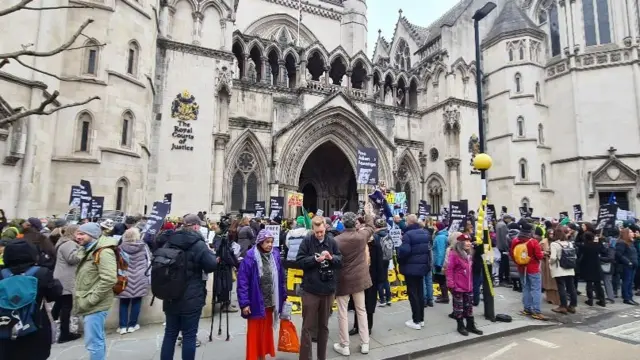
With the hearing under way inside the High Court the scene outside has certainly calmed down from earlier.
Hundreds of supporters are still standing outside and holding their placards as the London traffic passes by.
But the media attention remains as I see broadcasters from around the world continue doing live reports from outside the court.
Don't forget this is a UK court hearing the case of an Australian citizen on a potential US crime - it is international by any measure.
 Dominic Casciani
Dominic Casciani
Home and legal correspondent, reporting from the High Court
We’ve had a short break due to live video link technical gremlins.
Ed Fitzgerald KC is back on his feet and setting out his arguments about why there is a “real risk“ that Assange will suffer “a flagrant denial of justice”.
A key part of his argument is that the US-UK extradition treaty makes clear that a criminal suspect can’t be transferred from one country to another if the alleged wrongdoing is political in nature. That’s because the material Wikileaks published exposed wrongdoing by the US and therefore was an inherently political act - rather different to an ordinary crime.
The core of the US indictment - the formal demand that Assange is tried in an American court - is that he conspired to obtain national security and defence secrets he went on to publish.
“It is an abuse of process to seek extradition for a political offence,” says the barrister.
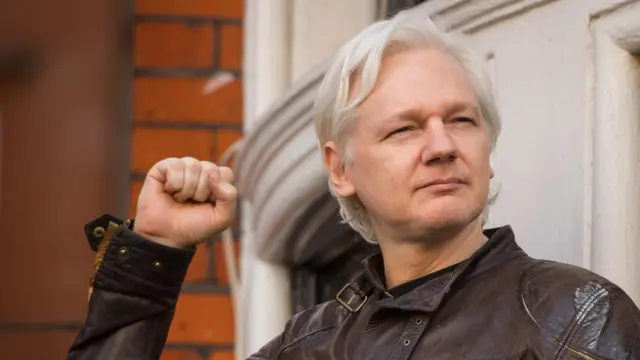 Image source, PA Media
Image source, PA MediaJulian Assange speaks from the balcony of the Ecuadorian embassy in London in 2017
For seven years, Julian Assange took refuge in a small office-turned-bedroom at the Ecuadorian embassy in an upmarket neighbourhood in central London.
Relations between him and the Ecuadorian government became more arduous after President Lenín Moreno took office in 2017.
A year before being told to leave the embassy, Assange was given a set of house rules, which included taking better care of his cat, James, and keeping the bathroom clean.
But in April 2019, President Moreno said Ecuador's patience had "reached its limit" with Assange's "discourteous and aggressive behaviour".
In an abrupt Twitter post, the president later announced the end of Assange's diplomatic asylum.
Other accusations levelled at the Australian national during his stay ranged from using a mobile phone not registered with the embassy to damaging the facilities by riding his skateboard and playing football indoors - despite being told not to do so.
Cleaning staff at the embassy had also described "improper hygienic conduct" throughout Assange's stay, an issue a lawyer had attributed to "stomach problems".
Read more on how Ecuador ended Assange’s stay at the London embassy here.
 Image source, Getty Images
Image source, Getty ImagesLabour MP Apsana Begum
Speaking from a rally in support of Julian Assange before the hearing, Labour MP Apsana Begum said the Wikileaks co-founder's case is "about people and their power, versus the state and its imperialism".
"Ultimately it is about seeking justice in an all too often unjust world," Begum added.
In a post on X, external earlier this year, the Labour MP said Assange's extradition should be opposed "in defence of press freedom globally".
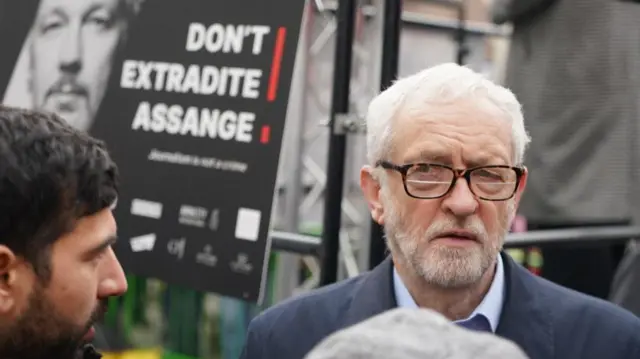 Image source, PA Media
Image source, PA MediaOther politicians in the crowd showing support for the Australian included former Labour leader Jeremy Corbyn.
Before the rally got under way, Corbyn said in a prepared statement posted on X, external that "there is one thing Julian is guilty of: telling the truth, telling the truth about war, about global crime".
 Dominic Casciani
Dominic Casciani
Home and legal correspondent, reporting from the High Court
Ed Fitzgerald says he also wants to argue in an appeal that Assange had been subject to a CIA plot to assassinate him while he was holed up in the Ecuadorian Embassy in London.
This allegation involves “specific evidence”, he argues, but has not been properly examined by British judges.
It must form part of Assange’s case, he says.
“There is a real risk of further extrajudicial actions against him by the CIA or other agencies,” Fitzgerald argues.
 Dominic Casciani
Dominic Casciani
Home and legal correspondent, reporting from the High Court
Ed Fitzgerald, Julian Assange's lawyer, is introducing his arguments for the permission to appeal.
The barrister tells the court that Assange is being subject to an “unjustified interference in freedom of speech”.
“The applicant is being prosecuted for political offences,” he says.
“The prosecution is politically motivated. Mr Assange was exposing serious criminality. He is being prosecuted for engaging in ordinary journalistic practice of obtaining and publishing classified information, information that is both true and of obvious and important public interest.”
 Dominic Casciani
Dominic Casciani
Home and legal correspondent, reporting from the High Court
The hearing is beginning.
Dame Victoria Sharp and Justice Johnson have entered court.
Julian Assange is not in court and not on a video link to the court from prison.
Ed Fitzgerald KC, for Assange, thanks the court for efforts it had made to see if he could attend - but tells the judges his client is not well today and therefore unable to attend the hearing at all.
“Mr Assange did ask for permission to attend which we gave,” says Dame Victoria.
“I think he took steps to find out whether a video link would be available if he preferred that.”
 Dominic Casciani
Dominic Casciani
Home and legal correspondent, reporting from the High Court
Today’s “permission to appeal” hearing - starting at 10:30 - could be Julian Assange’s last realistic opportunity to avoid extradition to the United States.
If the two judges here at the High Court - Dame Victoria Sharp and Mr Justice Johnson - refuse to allow Assange to challenge the extradition order, then his only route to stop US Marshalls arriving on a flight is the European Court of Human Rights.
But that’s a very tall order. The ECHR in Strasbourg has a very well-established and settled position on sending suspects from the UK to the US - and it generally concludes they will be treated in a way that does not breach their human rights.
If this two-day hearing goes against Assange, he will be given time to ask the ECHR to intervene - but there is no certainty it will. If he wins permission to appeal, the whole case goes away again - probably for months - while that full challenge is prepared.
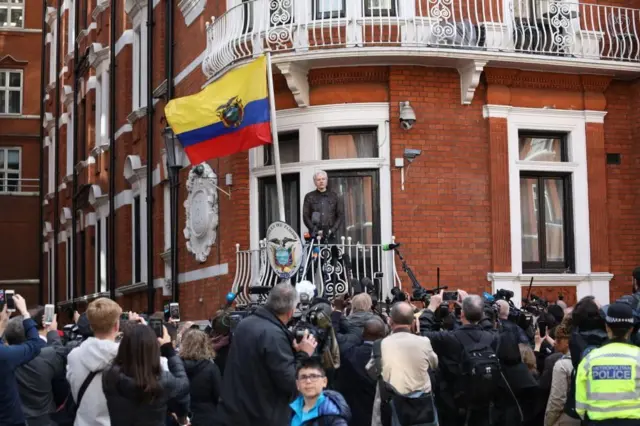 Image source, PA Media
Image source, PA MediaJulian Assange is currently being held at HMP Belmarsh
As the hearing gets under way, let's look back at why we are here.
Julian Assange was due to be released from HMP Belmarsh in September 2019 after serving a prison sentence for breaching bail conditions.
The Wikileaks co-founder has instead been kept behind bars ever since, as he has continued to fight extradition to the US, due to his “history of absconding”.
Assange‘s original prison term came after he spent seven years living in the Ecuadorian embassy in London, after seeking asylum there to avoid extradition to Sweden on a rape allegation. He feared this could lead to him being sent to the US to face charges over Wikileaks.
He denied the rape allegation and the Swedish investigation was dropped in May 2017.
But he was sent to Belmarsh prison after being found guilty in 2019 of breaching his bail conditions with his stay at the Ecuadorian embassy.
Assange lost a subsequent bid for bail in January 2021 after the court initially ruled that he could not be extradited because of the risk he might kill himself.
The US won its appeal in December 2021 and then-Home Secretary Priti Patel confirmed the extradition order the following year after the decision was upheld by the Supreme Court.
The hearing is due to start now. We'll bring you updates as we get them.